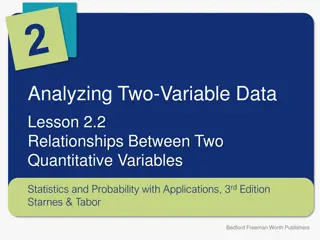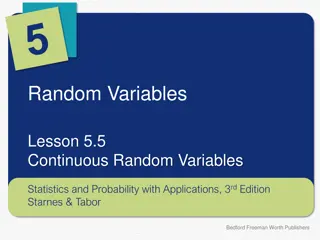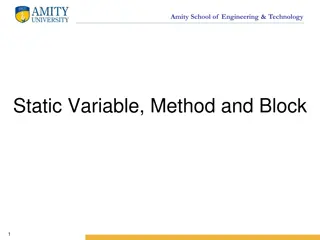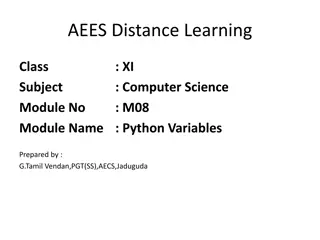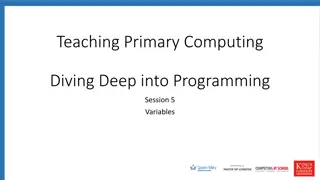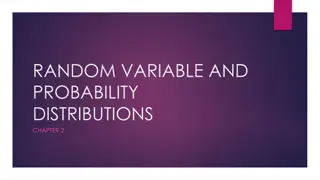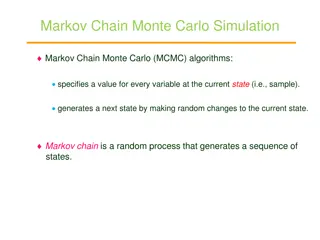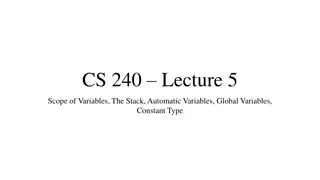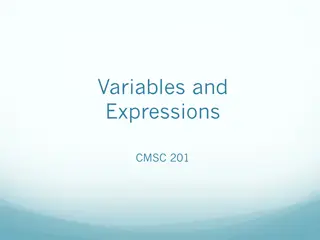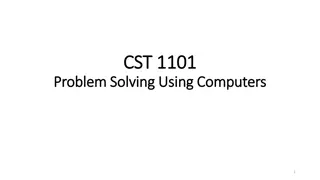Understanding Variables in Educational Research
Variables in educational research play a crucial role as symbols of events, traits, or characteristics that can be measured and categorized. Different types of variables such as change, effect, and outcome variables are essential in studying causal relationships. Dependent variables represent outcomes, while independent variables are manipulated factors. Examples illustrate how variables are used in research questions. Overall, variables are key components in educational research studies.
Download Presentation

Please find below an Image/Link to download the presentation.
The content on the website is provided AS IS for your information and personal use only. It may not be sold, licensed, or shared on other websites without obtaining consent from the author. Download presentation by click this link. If you encounter any issues during the download, it is possible that the publisher has removed the file from their server.
E N D
Presentation Transcript
VARIABLES IN EDUCATIONAL RESEARCH
The term variable is as a synonym for a construct or property being studied. It is a symbol of an event, act or characteristic, trait or attribute that can be measured and to which we assign categorical values. A concept that is observable, measurable and has a dimension that can vary. For example, temperature is a variable that is observable, measurable, and varies from high to low. A variable is defined as anything that varies or changes in value. Because variable represents a quality that can exhibit differences in value, usually magnitude or strength, it may be said that a variable generally is anything that may assume different numerical or categorical values
TYPES OF VARIABLES CAUSE Change variables Variables that affect the relationship Variables that link EFFECT Outcome variables
In research, or studies that are attempting to study a casual based relationship, four sets of variables may operate: A) Change variables that are responsible for bringing about change in a phenomenon. B) Variables which affect the link between cause and effect variables; C) Outcome variables which results from the effects of a change variable; and d) Connecting or linking variables, which in certain situations important to complete the relationship between the cause and effect.
DEPENDENT VARIABLE EXAMPLES: Research Question 1: The relationship between mosquitoes and mosquito bites. Dependent variable: the number of mosquito bites per hous. Research Question 2: A study of the effect of teacher praise on the reading achievement of second-graders. Dependent variable: the reading achievement of second graders.
DEPENDENT VARIABLE They are also referred as outcome or effect or responding or criterion variables. The variable that is the effect or the result or outcome of another variable is the dependent variable. The dependent is the factor that may change as a result of changes made in the independent variable. Variable that is influenced by the independent variable
INDEPENDENT VARIABLE They are also referred as manipulated or experimental or treatment variables. The independent is a factor that s intentionally varied by the experimenter. The values of the independent variable are under experimenter control. Variable that is believed to cause or influence the dependent variable
EXAMPLES Research Question 1: The relationship between mosquitoes and mosquito bites. Independent variable: The number of mosquitoes per acre of ground. Research Question 2: A study of the effect of teacher praise on the reading achievement of second graders. Independent variable: The amount and kind of praise .no praise, written praise or both.
Relationship between Independent and Dependent Variables INDEPENDENT VARIABLES DEPENDENT VATRIABLES Cause Effect It is a Causal Relationship
MODERATE VARIABLE A moderator variable is a secondary independent variable that the researcher selects because he or she thinks it may have a strong contingent effect on the relationsip between the primary independent variable and the dependent variable. A variable that influence or moderates, or modifies the relation between two or other variables and thus produces an interaction effect.
EXAMPLES Research Question 1: Does anxiety affect test performance and if so, does it depend on test taking experience? 1. Independent variable- anxiety level 2. Moderator variable - Test taking experience 3. Dependent variable- test performance
Research Question 2: Effects of library facilities available on achievement of students. 1. Independent variable: library facilities 2. Moderator variable: interest and inclination towards reading 3. Dependent variable: academic achievement
INTERVENING VARIABLES A variable that explains a relation or provides a causal link between other variables. Also called by some authors mediating variable or intermediary variable. It cannot be measured It is affected by the independent variable and it affects the dependent variable.
EXAMPLES Research Question 1: Marital status causes the degree of social integration which affects the suicide rate. 1. Independent variable: marital status 2. Intervening variable: the degree of social integration 3. Dependent variable: suicide rate
Research Question 2: Higher education typically leads to higher income. Independent variable- higher education Intervening variable- better occuation Dependent variable- higher income
CONTROL VARIABLE An extraneous variable that an investigator does not wish to examine in a study. Thus the investigator controls this variable. It is also called a covariate. The factor that is kept constant all throughout the experiment. There can be many controlled variables in an experiment. For example: Does changing the temperature of a ball effect the affect the height the ball will bounce? Controlled variables: Small ball Dropped from same height Dropped onto the same surfaces





